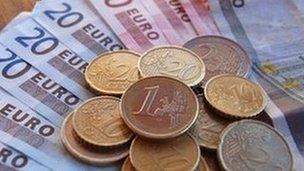Ireland to exit international bailout in December
- Published

Ireland will leave the EU-IMF bailout on 15 December
Ireland is to make a clean break from its three-year 85bn euro (£71bn) bailout programme next month, without seeking precautionary funding.
The Irish prime minister (taoiseach) Enda Kenny confirmed the move during a speech to the Irish parliament.
The Irish economy is emerging from one of the deepest recessions in the eurozone, having sought an international bailout in November 2010.
Ireland is due to leave the EU-IMF bailout on 15 December.
Mr Kenny said: "We will exit the bailout in a strong position. The government has been preparing for a return to normal market trading.
"We will set out a path to a brighter economic future for our people, a path from mass unemployment to full employment, from involuntary emigration to the return of thousands of people who have to leave for other countries to find work.
"Today is just the latest step in that ongoing journey, a significant step indeed but also just another step towards our ultimate job of getting Ireland working again."
He added that German chancellor Angela Merkel pledged to work closely with Ireland to improve funding mechanisms for the economy, including access to finance for small and medium businesses.
"The German government has asked KFW, the German development bank, to work with the German and Irish authorities swiftly, in order to deliver on this initiative at the earliest possible date," Mr Kenny said.
Strategic outline
International Monetary Fund managing director Christine Lagarde said the performance of Ireland bodes well for the future.
"The Irish authorities have established a very strong track record of policy implementation. This bodes well as Ireland exits its EU/IMF-supported programme," she said.
"Although uncertainties remain in Europe and the global economy more broadly, Ireland is in a strong position in terms of its bond yields and has built a sizable cash buffer. We look forward to continuing to work with the authorities as they address the challenges that remain."
It is understood a decision not to seek a special overdraft facility was finalised at an emergency cabinet meeting on Thursday, ahead of Finance Minister Michael Noonan flying out to a summit in Brussels.
Mr Noonan said the decision was in Ireland's best interests, and that he hoped to publish the main outlines of a medium-term economic strategy before 25 December.
The Department of Finance said confidence and sentiment towards Ireland has improved considerably in recent months and domestic and international economic conditions were also improving.
Deputy prime minister Eamon Gilmore told the parliament it was an "historic, important and welcome" announcement.
However, the Labour leader added: "There will be no celebration until our economic fortunes are fully recovered."
Mr Gilmore said the renegotiation of bailout interest rates and the Anglo bank promissory note were among the reasons Ireland can cleanly exit the bailout.
Micheál Martin, leader of the opposition Fianna Fáil party, said a case should be presented by the government on why Ireland does not need a precautionary credit line.
He said there was no need for a "stage-managed" announcement.
Sinn Féin president Gerry Adams welcomed the move but said the government should not applaud itself for decimating public services and leaving families across the state in poverty.
Independent member Stephen Donnelly described it as a "bittersweet moment" for Ireland and said there was a need for retrospective capitalisation.
Another independent member, Shane Ross, said the bond markets would require as much austerity as the Irish government had been "imposing at the whim of the troika (the European Union, European Central Bank and International Monetary Fund who provided the bailout)".
- Published7 November 2013
- Published15 October 2013